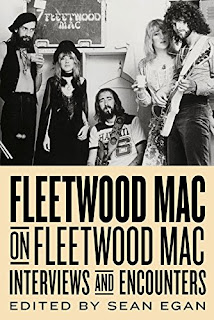 Once upon a time I had about a hundred eBooks housed in a library connected to an online retailer. If you know the site of which I speak, you know they folded at the turn of the year and gave customers a short window of opportunity to download and save. I managed to get twenty books to safety but unfortunately one of them wasn't my copy of Kicking and Dreaming: A Story of Heart, Soul, and Rock and Roll, which I had purchased a few years back with the intent of reviewing here. I'm slowly working to replace what I lost, what I remember buying, anyway.
Once upon a time I had about a hundred eBooks housed in a library connected to an online retailer. If you know the site of which I speak, you know they folded at the turn of the year and gave customers a short window of opportunity to download and save. I managed to get twenty books to safety but unfortunately one of them wasn't my copy of Kicking and Dreaming: A Story of Heart, Soul, and Rock and Roll, which I had purchased a few years back with the intent of reviewing here. I'm slowly working to replace what I lost, what I remember buying, anyway.Not unlike the reading of the book, I seem to fall behind where Heart is concerned. I had become aware of their existence in the early 80s but didn't give thought to the singles out at the time. "Tell It Like It Is" and "This Man is Mine" were a bit too doo-wop and ballad-y for my tastes then, despite Ann's killer vocals, and I hadn't realized these songs weren't necessarily representative of the overall Heart sound. Then by the mid-80s they'd launched into this MTV, male-gaze video era with the gold corsets, big hair, and bouncing boobies before a backdrop of flashpots and lightning. It appeared a bit much, but that was the point of the 80s - excess for success, and Heart was a 70s band pushed to take those extremes to stay relevant and solvent. In a way it worked, because the frequent radio play encouraged me to seek out their earlier hits. It wasn't until a few years ago, though, I took the opportunity to see them live - both shows post-Hall of Fame victory laps. My daughter and I loved them, but with these recent family fallouts happening I fear there won't be other concerts.
Well, I got a replacement copy of the book. Upon finally reading it I find it's presented in "oral history" format with Ann and Nancy on a round robin storytelling pattern. There are a few books reviewed here that employ this writing method (VJ, Starting Over, Nothin' To Lose) and while it's not my favorite style I find it's effective when you have several voices in the chorus. Oral history books risk a breakdown of cohesion in telling a story, but more perspectives help to create a large picture and a better sense of time and setting, even if dates aren't exact. But for a few "guest shots" in this book - collaborators and former bandmates - the book is mostly Ann and Nancy, which is appropriate in a way, considering they are the most visible faces in Heart. For years I used to think Heart was strictly a duo. Shows what I know.
Kicking and Dreaming tells the evolution of the Wilson sisters' career in their own words, starting with a shared mobile military-family childhood, through thankless gigs in Canadian bars and early battles with their first label. Similar to points in lives like Lita Ford's, the sisters contended with sexism in the industry (even from female execs - e.g. the corset years) and not-always faithful companions. They have great anecdotes to share, particularly about early touring years and the struggle to become known for original work rather than covers. One such story about John Mellancamp may encourage you to whack him upside the head when you see him next.
For everything interesting in Ann and Nancy's journey, though, I tended to be pulled away from it at times due to the book's presentation. I note there's a third author listed and I'm not sure of his purpose, given the spots of spelling and syntax errors throughout the book. Other reviewers have noted continuity errors - incorrect release dates and such - but if I don't intimately know a band's discography I'm willing to forgive such things. Memories may challenge us, and I got the impression Kicking and Dreaming came out as a transcript with a perfunctory polish.
I appreciate Heart more than I did in my youth. Rock music is a male-dominated industry and I suppose we're conditioned to gravitate more toward male artists. Ann and Nancy challenged that norm early on by fronting a band, writing songs and playing their instruments. We see more women leading groups as a result, and if more are able to catch breaks in this business they may have the women in Heart to credit. Kicking and Dreaming is a rich history with rough spots, but worth reading.
Rating: B-
Kathryn Lively is slowly recovering.











